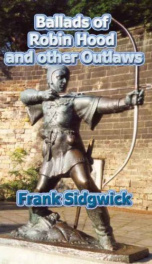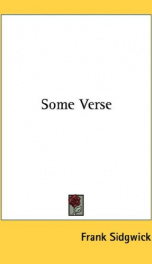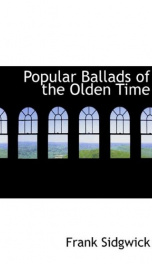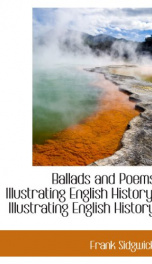Ballads of Robin Hood and other Outlaws

From Content: "This volume concludes the series, begun in 1903, which was intended to comprise all the best traditional ballads of England and Scotland. The scheme of classification by subject-matter, arbitrary and haphazard as it may seem to be at one point or another, has, I think, proved more satisfactory than could have been anticipated; and in the end I have omitted no ballad without due justification. In the fourteen years which have elapsed since the completion of Professor Child's collection, there has been discovered, so far as I know, only one ballad that can claim the right to be added to his roll of 305 'English and Scottish Popular Ballads.' That one is the carol of The Bitter Withy, which I was fortunate enough to recover in 1905, which my friend Professor Gerould of Princeton University has annotated with an erudition worthy of Child, and the genuineness of which has been sponsored by viii Professor Gummere.1 I should perhaps have included this in its place in my Second Series, had I known of it in time, but I still hope to treat the traditional English Carols separately. I ought to admit here that the confidence with which I claimed, in my Third Series, a place on the roll for The Jolly Juggler, has abated, and I now consider it to be no more than a narrative lyric without any definitely 'popular' characteristics. These four volumes contain in all 143 ballads, four of which are not to be found in Child's collection.2 Thus, out of his 305, I have omitted more than half; but it must be remembered that his work was a collection, and mine-si parva licet componere magnis-has been selection. The omitted ballads are either:- (i) Fragmentary or mutilated; (ii) Closely related to ballads which I include; (iii) Uninteresting, e.g. as dealing with obscure history; (iv) Degenerate. The last reason for exclusion particularly affects the Robin Hood ballads, among which ix Child prints thirty-three late broadsides and fragments which I omit. He preferred to err by inclusion rather than exclusion, and states that he has admitted more than one ballad, 'actually worthless and manifestly spurious, because of a remote possibility that it might contain relics, or be a debased representative, of something genuine and better.' I cannot take leave of nine years' intermittent work on this selection without remembering that its 'only begetter' was Mr. A. H. Bullen, with whom I published the first three volumes. While I regret to think how different it is in the result from the edition he then envisaged, I gratefully acknowledge my indebtedness to him for the inoculation. The anthologist is strictly a plucker of the flowers of literature; but the ballads are not literature-they are lore, and therefore of warmer human interest."
Info about the book
Author:
Series:
Unknown
ASIN:
B008403JJM
Rating:
3/5 (4)Your rating:
0/5
Languge:
English
Users who have this book
Users who want this book
What readers are saying
What do you think? Write your own comment on this book!
write a commentif you like Ballads of Robin Hood and other Outlaws try:
Do you want to exchange books? It’s EASY!
Get registered and find other users who want to give their favourite books to good hands!





